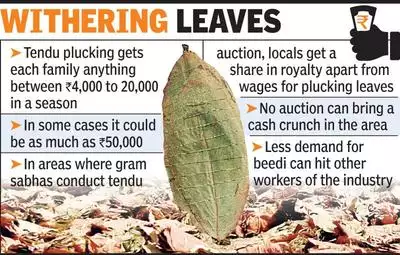- Home
- Prelims
- Mains
- Current Affairs
- Study Materials
- Test Series
 EDITORIALS & ARTICLES
EDITORIALS & ARTICLES
Clash over 'Green Gold'
Tribal residents of 50 villages in Chhattisgarh’s have decided to file an FIR against the officials.
- As the official had seized Tendu leaves collected by tribals and they wanted to sell on their own instead of to the government.
- Forest produceis defined under section 2(4) of the Indian Forest Act, 1927.
- Minor Forest Produce (MFP) is a subset of forest produce and got a definition only in 2007 when the Scheduled Tribes and Other Traditional Forest Dwellers (Recognition of Forest Rights) Act, 2006, was enacted.
- Section 2(i) of the act defines a Minor Forest Produce (MFP) as all non-timber forest produce of plant origin and includes bamboo, brushwood, stumps, canes, Tusser, cocoon, honey, waxes, Lac, tendu/kendu leaves, medicinal plants and herbs, roots, tuber and the like ones.
- As per the Report of the National Committee on Forest Rights Act, submitted in 2010, in all, about 100 million people living in and around forests derive at least part of their livelihood from collection and marketing of non-timber forest products or MFPs.
- This includes, in addition to Tribals, Dalits, other forest dwellers whom have not been officially declared as tribals, women, and other marginalised groups.
Issue
- Tenduis also called ‘green gold’ and is a prominent minor forest produce in India.
- In 1964, the trade in tendu leaves was nationalised in then-undivided Madhya Pradesh. Until then, people were free to sell tendu leaves in markets across the country.
- Under the state provision the state forest department collects tendu leaves, allows their transportation and sells them to traders.
- Now, the villagers have claimed that the Gram Sabhas of 13 villages had passed a proposal to collect and sell tendu leaves on their own.
- Despite this, the forest range officer seized 250 sacks of tendu leaves.
- Even the documents related to the confiscation of these goods have not been handed over to the tribals.
- The villagers, who are enraged by the development, have consequently decided to lodge an FIR against the officer.
Forest Rights Act 2006 says
- FRA enacted in 2006 recognises the rights of forest-dwelling tribal communities and other traditional forest dwellers to forest resources on which these communities were dependent for a variety of needs, including livelihood, habitation and other socio-cultural needs.
- It recognizes and vests the forest rights and occupation in Forest land in Forest Dwelling Scheduled Tribes (FDST) and Other Traditional Forest Dwellers (OTFD) who have been residing in such forests for generations.
- It strengthens the conservation regime of the forests while ensuring livelihood and food security of the FDST and OTFD.
- The Gram Sabha is the authority to initiate the process for determining the nature and extent of Individual Forest Rights (IFR) or Community Forest Rights (CFR) or both that may be given to FDST and OTFD.
|
Role of Gram Sabha Under the Forest Rights Act, 2006, the Gram Sabha has been assigned the following roles for implementing the provisions of the Act:
|
- Rights Under the Forest Rights Act:
- Title rights: It gives FDST and OTFD the right to ownership to land farmed by tribals or forest dwellers subject to a maximum of 4 hectares.
- Ownership is only for land that is actually being cultivated by the concerned family and no new lands will be granted.
- Use rights: The rights of the dwellers extend to extracting Minor Forest Produce, grazing areas etc.
- Relief and development rights: To rehabilitate in case of illegal eviction or forced displacement and to basic amenities, subject to restrictions for forest protection.
- Forest management rights: It includes the right to protect, regenerate or conserve or manage any community forest resource which they have been traditionally protecting and conserving for sustainable use.
Need for reforms
- Administrative Apathy: As tribals are not a big vote bank in most states, governments find it convenient to subvert FRA or not bother about it at all in favour of monetary gains.
- The forest bureaucracy has misinterpreted the FRA as an instrument to regularise encroachment instead of a welfare measure for tribals.
- Corporates fear they may lose the cheap access to valuable natural resources.
- Dilution of Act:
- Certain sections of environmentalists raise the concern that FRA bends more in the favour of individual rights, giving lesser scope for community rights.
- Institutional Roadblock:
- Rough maps of community and individual claims are prepared by Gram Sabha which at times often lack technical knowhow and suffers from educational incapacity.
- Misuse of FRA:
- The FRA has been misused and communities have rushed to file claims. Politicians across party lines have interpreted FRA as a land distribution exercise and have fixed targets for districts.
Road ahead
- It is important that the governments at Central and State levels are strengthened with human and financial resources to help implement FRA on a mission mode.
- Besides leveraging modern technology to map and monitor the implementation of FRA, the forest bureaucracy must also be reformed to serve as service providers to gram sabhas.
- Gender inclusive initiatives must be taken so that the work opportunities should be equal for both men and women with adequate protection of their rights.
This activity has a strong linkage to women’s financial empowerment as most of the Minor Forest Produces are collected and used/sold by women. Minor Forest Produce sector has the potential to create about 10 million workdays annually in the country. Hence governments and officials should leave exploiting innocent tribals and should be paid for their resources, as MFP are not just a source for their earning but attached to their culture and social activities.









 Latest News
Latest News
 General Studies
General Studies